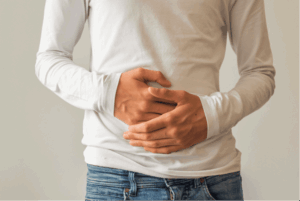Blog
What Causes Intestinal Spasms?
 The digestive tract is made up of a series of hollow organs joined in a long, twisting tube that breaks down food into energy or waste. Food’s journey begins in the mouth and travels down the esophagus into the stomach. When in the stomach, food then breaks down and all excess materials are sent through the small intestine, into the large intestine (including the colon and rectum) and then out of the anus. Along the way, gasses and other irritants can cause painful bloating and cramps. This occurs when a spontaneous and sudden contraction of the muscles, called an intestinal spasm, causes the area to tighten and move irregularly. Normal contractions are rarely noticeable while intestinal spasms are often painful and obvious.
The digestive tract is made up of a series of hollow organs joined in a long, twisting tube that breaks down food into energy or waste. Food’s journey begins in the mouth and travels down the esophagus into the stomach. When in the stomach, food then breaks down and all excess materials are sent through the small intestine, into the large intestine (including the colon and rectum) and then out of the anus. Along the way, gasses and other irritants can cause painful bloating and cramps. This occurs when a spontaneous and sudden contraction of the muscles, called an intestinal spasm, causes the area to tighten and move irregularly. Normal contractions are rarely noticeable while intestinal spasms are often painful and obvious.
Irritable Bowel Syndrome
Intestinal spasms are often associated as a sign or symptom of irritable bowel syndrome (IBS). Irritable bowel syndrome is a functional digestive disorder, which means that the digestive tract appears undamaged, but it still causes symptoms. It affects 10 to 15 percent of people worldwide, making it the most common functional digestive disorder. Along with intestinal spasms, IBS causes abdominal pain, bloating, constipation, diarrhea, and gas. Spasms are so common with IBS that the intestinal disorder is also referred to as “spastic colon.”
Inflammatory Bowel Disease
Following IBS as the most common cause of intestinal spasms, inflammatory bowel disease is the term given to a group of chronic conditions involving inflammation of the digestive tract. The most common types of IBD are Crohn’s disease and ulcerative colitis. Crohn’s disease is a chronic condition that can cause inflammation to any part of the digestive tract. This disease causes unpleasant symptoms such as intestinal ulcers, discomfort, and pain.
Ulcerative colitis occurs when the lining of your large intestine becomes inflamed. This inflammation produces tiny sores called ulcers on the lining of your colon. It usually begins in the rectum and spreads upward – sometimes involving your entire colon. The inflammation causes your bowel to move its contents rapidly and empty frequently. As cells on the surface of the lining of your bowel die, ulcers form. The ulcers may cause bleeding and a discharge of mucus and pus.
Both conditions can cause spasms and other associated symptoms such as constipation, diarrhea, fatigue, the urge to pass stool frequently, and even weight loss. Intestinal spasms share many of the same symptoms as IBS which is why it is important to make an appointment with your doctor to determine the underlying cause of your condition.
Gastroenteritis
Too much gas in the intestines may lead to spasms as the muscles strain to let out the gas. Gastroenteritis is the inflammation of both the stomach and the intestines. The condition is usually caused by viruses, bacteria, or contaminated food (food poisoning). Although painful and irritating, common acid reducing medication and probiotics can reduce intensity and frequency.
Muscle Strain
Working the abdominal muscles too hard or too often can lead to increased stomach and intestinal spasms. People who regularly do core exercises such as crunches and sit-ups are at a higher risk of experiencing spasms as a result. A hernia is a condition in which an organ or other structure protrudes through a weak part of tissue or muscle. Inguinal hernias are the most common type of a hernia and occur when part of the intestines protrudes through the abdominal muscles into the groin area. This unnatural pressure can lead to more serious digestive related problems including intestinal spasms.
Potential Causes of Intestinal Spasms
Muscles require proper nutrition and hydration to function correctly. When nutrient deprived, muscles are forced to do the small amount of working off less energy, causing strain and pressure. Dehydration can cause an imbalance of electrolytes in the body, particularly sodium. Monitoring proper daily intakes of water and other vitamins can help everything running on par. In addition to the causes previously listed, colon spasms can be the result of other underlying health conditions or issues. These causes may be unidentifiable to an untrained eye which is why you should contact your doctor if intestinal spasms persist for more than a few days.
Gastroenterologists for Stomach Spasms in NJ
At Digestive Healthcare Center, our gastroenterologists have years of experience diagnosing and treating a wide array of digestive health conditions, including those that can cause painful intestinal spasms. The members of our team will determine the cause of your pain and then work towards finding you relief. Learn more about our gastroenterologists in NJ, their areas of expertise, and how they can help you start living more comfortably.
Our Gastroenterology Centers in Somerset County
We are proud to provide comprehensive gastroenterology care at our office locations in NJ, serving patients from the surrounding areas and helping them get on track to healthier and more comfortable living. Our Warren office is currently closed, but we are seeing patients at our Hillsborough and Somerville offices. Can’t make it into the office? We also offer convenient telemedicine virtual visits so you can meet with a DHC physician from the comfort of your home! If you are experiencing intestinal spasms or other digestive health symptoms that cause you discomfort or concern, don’t hesitate to schedule an appointment at DHC today.
Intestinal Spasm Relief in New Jersey
The severity of colon spasm symptoms can vary from person to person. With proper treatment and care, managing these chronic illnesses is possible. For more information about intestinal spasms and other digestive health-related questions, contact the experts at Digestive Healthcare Center. Our fantastic team specializes in providing excellent gastrointestinal care in New Jersey. Schedule your appointment today to find the right treatment for you!
Make an Appointment for Comprehensive Digestive Care in NJ
At Digestive Healthcare Center, we want each patient at our three offices in New Jersey to feel confident about their digestive health. We encourage you to contact us today to make an appointment with one of our expert gastroenterologists – don’t wait to start putting your digestive health first!
Recent Blogs
Learn more about all things digestive health and wellness by checking out our recent gastroenterology blogs.

Walk in Solidarity and Support Breast Cancer
Blog On October 21st the DHC team and family members had a wonderful time walking in solidarity and support of Breast Cancer in honor of

The Do’s and Don’ts of Eating This Holiday Season
Blog The holiday season is officially upon us, complete with holiday food and cheer. While this time is well renowned for being “the most wonderful
Tame Your Flame: Our Summer Guide to Digestive-Friendly Eating
Blog With summer officially upon us, barbecue season is in full swing. That means blue skies, sunshine and making merry memories. Whether you’re invited to
